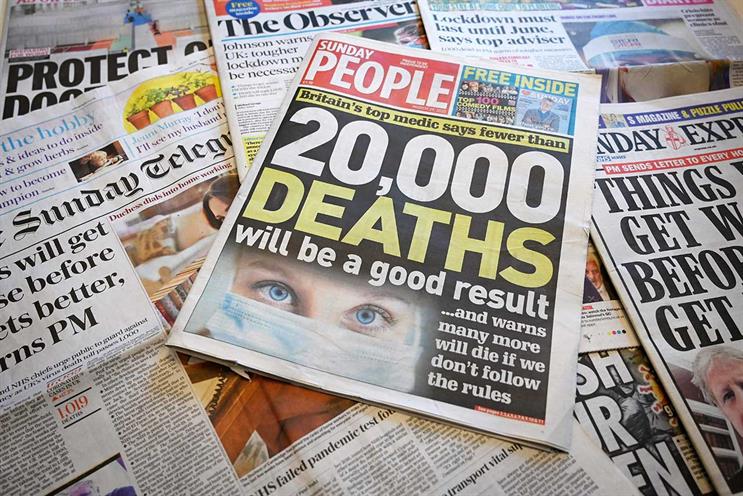
The coronavirus crisis is harming many news organisations.
Online traffic has soared, but advertising and print circulation revenues have collapsed as brands pull spend and block ads from appearing next to Covid-19 content, while retailers have shut.
±±ľ©Čüłµpk10 has estimated that the UK ad market will drop 50% in April.
Many publishers, including City AM, the Evening Standard, Guardian Media Group, Newsquest, PA Media, Reach, TI Media and Time Out, have furloughed staff, reduced salaries and cut back on print distribution.
Publishers have appealed to politicians for help. Culture secretary Oliver Dowden has written to 100 leading advertisers, urging them not to block ads on trusted news sites, and the government and Newsworks have agreed a coronavirus ad campaign, worth tens of millions of pounds, to run across newspapers for the next three months.
Enders Analysis has called on Whitehall to consider additional support – from funding the cost of local businesses advertising in newspapers to temporary financial holidays from certain taxes and other costs – to prevent news organisations from collapsing.
The National Union of Journalists has proposed a radical step: an immediate windfall tax of 6% on the tech giants to be used to support news organisations.
Market intervention is possible. Australia this week announced plans to force Google and Facebook to share ad revenue with domestic media companies.
Yet there is also a question about whether advertisers and their agencies have a responsibility to support journalism and commercial news media, especially at this time of crisis when trusted information is a vital public service.
Do news publishers need special financial support because of the virus ad slump?
 Douglas McCabe
Douglas McCabe
Chief executive, Enders Analysis
Yes. Covid-19 has sent online news surging, with publishers experiencing massive traffic uplift, as trusted news sources become increasingly important. But the industry is still heavily reliant on print revenues and we are seeing supply chains come under extreme pressure as core readers self-isolate and retail giants close or de-prioritise news media [in stores].
Advertising – including categories like retail and travel – has collapsed. In the face of existential threats to the sector, we have written to DCMS [Department for Digital, Culture, Media & Sport] to mobilise government funding to sustain news provision and journalism.
The industry needs a life raft. We have six key asks: an emergency fund for journalists; the government to commit its own advertising across the press; the government to pay for local advertising on behalf of businesses during the crisis; publishers and distributors to be given key worker status; the funding of home delivery, especially for the over-70s; temporary financial holidays from some costs such as business rates and VAT.
 Michelle Stanistreet
Michelle Stanistreet
General secretary, National Union of Journalists
At the same time as upending our lives, the Covid-19 crisis has demonstrated the vital role of quality journalism in the spectrum of essential public services. The economic shockwaves of lockdown are pushing many media companies to the brink.
That’s why the NUJ is calling for intervention to shore up this critical sector – including an immediate windfall tax of 6% on the tech giants, increased government advertising, an urgent resolution to the blocking of virus-related content on top of proposals aimed at creating a renewed news industry.
Our "News recovery plan, from health crisis to good news" recognises the vital role of quality journalism in our society and democracy, and how to create the environment necessary for a news media rooted in the public interest.
 Phil Smith
Phil Smith
Director-general, ISBA
News publishers are not alone in struggling to monetise an increased audience during this crisis. ISBA is working alongside the government and industry partners to encourage advertisers, where possible, to continue to support the news sector. Our recent guidance on using keyword blocking is one example of this.
We certainly welcome government’s support for trusted news in the shape of the programme of spending announced last week by Newsworks and we will be working with others in the industry to come forward with a strong package of measures to stimulate economic activity at the right time.
 Zoe Harris
Zoe Harris
Chief marketing officer, GoCompare.com; chief executive, AutoSave, GoCo Group
News publishers require all of our support:
- They require financial support because of the way that other monopolistic digital platforms are able to monetise their content – with or without Covid-19.
- They require support from advertisers because they provide us a unique context and effectiveness. If we don’t stick our hands in our pockets now, we risk losing one of the most ad-responsive and trusted environments we can buy. News brand print has an epic impactful daily reach – nothing can replace it.
- They require support from all of us as citizens because they do an incredible job at holding those in power to account – and, boy, never have we needed that more than we do right now.
 Luke Smith
Luke Smith
Chief executive, Croud
My career began in the national press, so I am saddened about blocklisting against Covid-19 content. It is 90% of the news. So where else are publishers supposed to run the ads?
The UK press have done an excellent job of keeping us informed (and indoors). As an advertising industry, we should be supporting their efforts. Let’s create ads that are on "tone" and accept news for what it is.
It is incumbent upon us all to find ways through this crisis and showing some solidarity and positivity by continuing to support the press is a prime example.
And, yes, given the papers are providing a public service at the moment, I would also advocate increased governmental support.
 Tracy De Groose
Tracy De Groose
Executive chair, Newsworks
Journalists have a civic duty. When that is jeopardised in any way, the government needs to act. Democracy dies in the dark and it’s in all our interests to help keep the lights on.



.jpg)


.jpg)